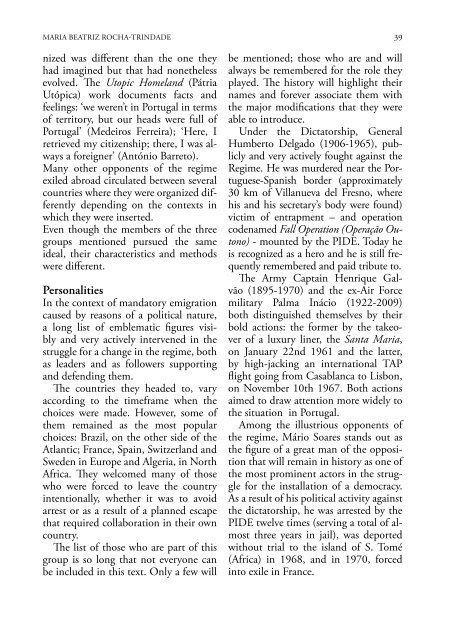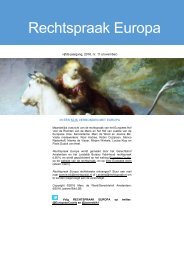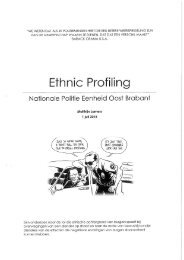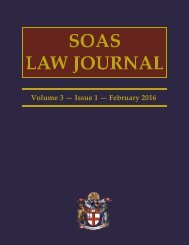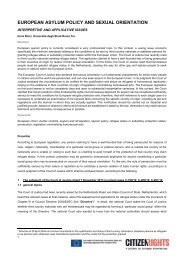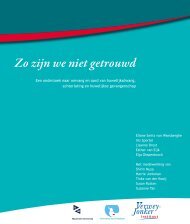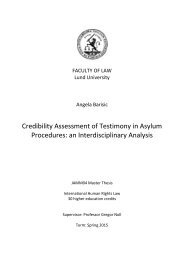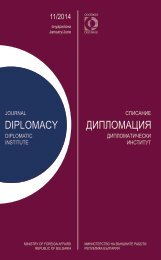AEMI
AEMI-2016-web
AEMI-2016-web
Create successful ePaper yourself
Turn your PDF publications into a flip-book with our unique Google optimized e-Paper software.
MARIA BEATRIZ ROCHA-TRINDADE<br />
nized was different than the one they<br />
had imagined but that had nonetheless<br />
evolved. The Utopic Homeland (Pátria<br />
Utópica) work documents facts and<br />
feelings: ‘we weren’t in Portugal in terms<br />
of territory, but our heads were full of<br />
Portugal’ (Medeiros Ferreira); ‘Here, I<br />
retrieved my citizenship; there, I was always<br />
a foreigner’ (António Barreto).<br />
Many other opponents of the regime<br />
exiled abroad circulated between several<br />
countries where they were organized differently<br />
depending on the contexts in<br />
which they were inserted.<br />
Even though the members of the three<br />
groups mentioned pursued the same<br />
ideal, their characteristics and methods<br />
were different.<br />
Personalities<br />
In the context of mandatory emigration<br />
caused by reasons of a political nature,<br />
a long list of emblematic figures visibly<br />
and very actively intervened in the<br />
struggle for a change in the regime, both<br />
as leaders and as followers supporting<br />
and defending them.<br />
The countries they headed to, vary<br />
according to the timeframe when the<br />
choices were made. However, some of<br />
them remained as the most popular<br />
choices: Brazil, on the other side of the<br />
Atlantic; France, Spain, Switzerland and<br />
Sweden in Europe and Algeria, in North<br />
Africa. They welcomed many of those<br />
who were forced to leave the country<br />
intentionally, whether it was to avoid<br />
arrest or as a result of a planned escape<br />
that required collaboration in their own<br />
country.<br />
The list of those who are part of this<br />
group is so long that not everyone can<br />
be included in this text. Only a few will<br />
39<br />
be mentioned; those who are and will<br />
always be remembered for the role they<br />
played. The history will highlight their<br />
names and forever associate them with<br />
the major modifications that they were<br />
able to introduce.<br />
Under the Dictatorship, General<br />
Humberto Delgado (1906-1965), publicly<br />
and very actively fought against the<br />
Regime. He was murdered near the Portuguese-Spanish<br />
border (approximately<br />
30 km of Villanueva del Fresno, where<br />
his and his secretary’s body were found)<br />
victim of entrapment – and operation<br />
codenamed Fall Operation (Operação Outono)<br />
- mounted by the PIDE. Today he<br />
is recognized as a hero and he is still frequently<br />
remembered and paid tribute to.<br />
The Army Captain Henrique Galvão<br />
(1895-1970) and the ex-Air Force<br />
military Palma Inácio (1922-2009)<br />
both distinguished themselves by their<br />
bold actions: the former by the takeover<br />
of a luxury liner, the Santa Maria,<br />
on January 22nd 1961 and the latter,<br />
by high-jacking an international TAP<br />
flight going from Casablanca to Lisbon,<br />
on November 10th 1967. Both actions<br />
aimed to draw attention more widely to<br />
the situation in Portugal.<br />
Among the illustrious opponents of<br />
the regime, Mário Soares stands out as<br />
the figure of a great man of the opposition<br />
that will remain in history as one of<br />
the most prominent actors in the struggle<br />
for the installation of a democracy.<br />
As a result of his political activity against<br />
the dictatorship, he was arrested by the<br />
PIDE twelve times (serving a total of almost<br />
three years in jail), was deported<br />
without trial to the island of S. Tomé<br />
(Africa) in 1968, and in 1970, forced<br />
into exile in France.


